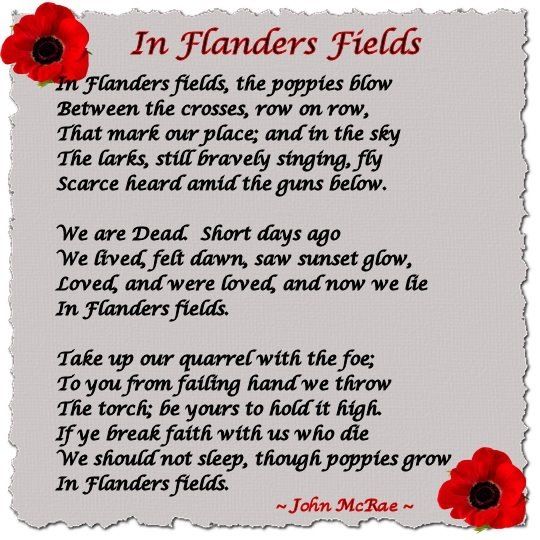Let us never forget ...

The poem, "In Flanders Field" commemorates the ancient tradition of the poppy as a symbol of fallen warriors and used to commemorate holidays such as Memorial Day and Veteran’s Day because of their propensity to appear on ravaged battlefields. There are records of white poppies appearing after battles as far back as those dominated by the warriors of Genghis Khan, as well as more recently in warzones after battles in World War I.
by Marsha Chartrand
It's been nearly 105 years since Emil Jacob died in service to his country during World War I.
Emil, the only soldier from Manchester who died during The Great War, as it was then known, grew up in Lenawee County but moved with his family to Sharon Township when he was 16. He was inducted into the Army, 18th Infantry, in 1917 and was killed in action in Germany in October 1918, less than a month before the war ended. He was just 23 years old. His family, not notified by the government until after the announcement of ceasefire, had been concerned after not hearing from him for a month, but "were buoyed by the hope that since hostilities had ceased he would return to them in safety." (From a newspaper clipping saved by his family).
Another newspaper article preserved by the Jacob family from that time, reads,
"In Memoriam. Since our Omnipotent Father, who knoweth and doeth all things well, has seen fit to take one from our midst, in the great sacrifice of human lives to the cause of Liberty and World Democracy, the members of the Soldiers' Aid mourn the loss of their esteemed friend and fellow member, Emil Jacob.
"He was among the first who went forth so valiantly to avenge the atrocities of our foe and fight for Liberty and Democracy, and he undoubtedly did his work there as he had always done with us, cheerfully and thoroughly.
"Well liked by all his associates, Emil will be greatly missed and his death will cast a shadow on the home-coming of our other boys, and each family, as they happily welcome their boy home, will have a deep feeling of sympathy for Emil's bereaved father, mother, sister, and brother.
"The members of the Soldiers' Aid feel sincere grief at the loss of a member who had so fine a character, so pure a nature, and so bright a future, and extend the deepest and most sincere sympathy to their fellow members, Mr. and Mrs. Chas. Jacob, and family, in their great loss and deep sorrow." (Signed) Mrs. Lewis Grossman, Mrs. Floyd Pardee, Committee on Resolutions, Sharon Soldiers' Aid.
These stories, as well as stories, anecdotes, and photos of the five Manchester boys lost during World War II, one approaching the Korean conflict, and three in the Vietnam Era, are collected in a book, "Lest We Forget," published by Mary Blossom for the Emil Jacob American Legion Auxiliary Unit #117, in 1999. Since that time, another young woman from Manchester, Jill LaRocque, died while serving her country in 2005. The book, published in a limited edition by the Auxiliary, is an amazing treasure trove of Manchester history and recalls times that are both long ago and yet barely a century old. It tells the story of the tumultuous 20th century, which saw four major wars, some lasting but months and others lasting many years, from the eyes of our small community which sacrificed ten young men in between the years of 1918 - 1967.
The five Manchester residents who died during WWI — Wayne Alber, Arthur Frey, Edward Brazee, Richard Seckinger, and Karl Rague — are described at some length in "Lest We Forget." Edward Brazee died in India and was the son of the pastor at Iron Creek Church; while Karl Rague was a doctor, the son of Emanuel Church's long-serving minister, and died of injuries sustained just five days after arriving on the Belgian front. Wayne Alber, of Sharon Township, had earned the rank of Second Lieutenant shortly before he was killed in a plane crash during a training mission along the Virginia-North Carolina border. Arthur Frey, a Sergeant in the Air Force, was in a plane that crashed over Chateaudun, France, on May 11, 1944. He was memorialized along with Edward Brazee on a large rock taken from the Frey farm and placed on the lawn of the Iron Creek Church. Richard Seckinger was just 22 years old when he was killed in October 1944 in Italy. His family owned a small grocery store on Adrian Street.
Though technically he died during what was considered "peacetime," Clarence Bivins had only recently turned 17 when his mother signed the papers for him to join the military service in January, 1947 — the fifth of her five sons to serve. "Mrs. Bivins holds Manchester's record for the numbers of sons in military service from one family," reads an an article clipping in "Lest We Forget." "Clarence is the fourth son to be in the Army and one served in the Navy."
Howard Parr wrote in 1998 for the book, comparing the loss to that of a Civil War-era family who lost five sons in battle:
"Both families seem to have been part of the multitude of unsung common folk who were doing just what they felt had to be done then. Five boys in each family, a long and complicated war, and losses which are always heart-wrenching to those left behind. Clarence lost his life in peacetime, after the close of the war, trying to de-fuse a bomb. But we should honor him in the same manner we do those who died on battlefields. Each in his own special way helped make it possible for us to live in a better and more peaceful world."
The Vietnam War Era claimed three more of Manchester's own: James Bihlmeyer of Freedom Township was the first on April 15, 1967. He, too was only 20 years old when he was killed in combat in Southeast Asia. Peter Valencich, of Manchester Township, followed shortly after on May 22, 1967. Just two months prior to his death he had been awarded the Bronze Star for heroism in action, having carried a wounded comrade 75 meters to safety from an unprotected open area.
Ronald Alexander of Manchester died, also during the Vietnam Era, while serving a 13-month tour of duty in Taejon, Korea in April 1966, at the young age of 19. No cause of death was announced by the Army at the time.
Not listed in "Lest We Forget," because it was published prior to her passing, is Jill LaRocque. LaRocque, who was an airman first class in the Air Force, was murdered by her ex-fiancé in 2005 when she was 22 years old. Her service, too, is honored as we remember those who have died while in the line of duty.
With the 50-year anniversary of the official "end" of the Vietnam War approaching in 2025, it may be time for this important piece of Manchester history to be updated, expanded, and made more fully available to the community. Because a community should never forget those who made the supreme sacrifice for their loved ones and their country.
Remember these veterans' stories — and the stories of others you may know — as you see the American Legion Auxiliary members on Main Street this Friday, giving out poppies for a donation. And be generous with your donation!










You must be logged in to post a comment Login